To the Wonder
 for some sexuality/nudity.
for some sexuality/nudity.
Reviewed by: Jeremy Landes
CONTRIBUTOR
| Moral Rating: | Average |
| Moviemaking Quality: |
|
| Primary Audience: | Adults |
| Genre: | Romance Drama |
| Length: | 1 hr. 52 min. |
| Year of Release: | 2013 |
| USA Release: |
April 12, 2013 (limited—19 theaters) DVD: August 6, 2013 |
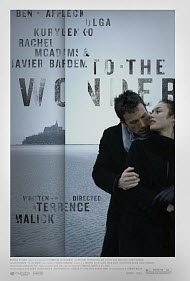

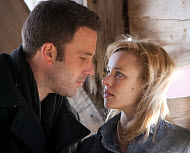


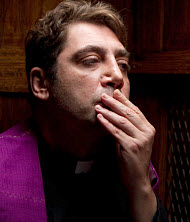
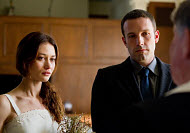

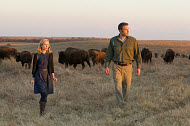
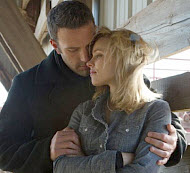


TRUE LOVE—What is true love and how do you know when you have found it? Answer
Catholic priests—Why do some feel it necessary to give up their religion to follow Christ? Answer
Review: Diary of a City Priest (2001)
| Featuring |
|---|
|
Ben Affleck … Neil Rachel McAdams … Jane Javier Bardem … Father Quintana Olga Kurylenko … Marina Charles Baker … Charles Romina Mondello … Anna See all » |
| Director |
|
Terrence Malick |
| Producer |
|
Redbud Pictures Glen Basner … executive producer See all » |
| Distributor |
| Magnolia Pictures |
Director Terrence Malick has made six films in 40 years. Though he doesn’t talk to the press, the ideas he communicates and the people he works with testify that he’s a devout follower of Jesus. His last three films (including “To the Wonder”), are heavily infused with voice-overs where his characters pray while trying to make sense of their lives. The universe, as Malick portrays it, is surrounded by the presence of God, bearing little relation with Hollywood’s normal story formulas.
This film and his last masterpiece, “The Tree of LifeTree of Life” have been much more episodic and ephemeral than plot-driven. Watching one of his films can feel aggravating, or as if you’ve been swept up into an awe-inspiring spiritual journey, depending on your point of view. Malick makes films that don’t seek to touch every audience member with a message that’s easily understood, but they invite you into a world filled with beauty, pain, and questions about the nature of God. Some might call them film-poems.
As someone who has loved all of Malick’s previous films, I have greeted each one as a present full of treasure waiting to be discovered. Yet, I walked out at the end of “To the Wonder” knowing I had viewed some extraordinary images, but still not caring much for any of the characters. I felt like I had just been to a ballet or a foreign language opera, where I hadn’t been offered any program notes. Most of the characters remain nameless and almost entirely voiceless throughout the film. We mostly listen to classical music and voice-over thought whispers, while watching the movie stars (Ben Affleck, Olga Kurylenko, and Rachel McAdams) frolic in Paris and Oklahoma, gazing at each other with love, kissing, shopping, communing with nature, and dancing/twirling with joy.
At the beginning, we see a man and woman in love who are walking around France, and we soon learn she has a daughter. The man invites the pair to come live with him at his home in Oklahoma where they continue their love affair. For reasons that were not clear to me, their relationship sours, then the woman and child are also forced to leave the U.S., because of their visa expiration.
The man lets her go and soon begins an affair with a local divorcée. That relationship ends when the Parisian woman wants to return to the U.S. without her daughter, and then she marries the man, causing further conflict that we don’t get to hear. We only see them yelling and throwing things around the house while music plays.
Also, about 25% of the scenes follow a troubled priest (played by Javier Bardem) who seeks to bring Christ with him on his visits to the poor and people in prison. He’s the pastor for the man and his wife, and he’s longing for God to reveal Himself to him again.
Perhaps Malick felt the need to tell this story because of his own marriage with a Frenchwoman that ended in 1998. According to one source, Malick shot 10.5 hours of footage without a script, and the film does feel like it was finally figured out after more than a year in the editing room. They should have spent more time. I found myself wishing for any kind of dramatic arc or tension. I found it hard to care about the love lives of characters who weren’t allowed to speak and who act strange (the Parisian woman seems to be dancing constantly) and sullen (Affleck’s constant expression).
I can imagine some people coming away from this film deeply moved by the images and narration reflecting characters’ yearning for God. But I still can’t recommend this film wholeheartedly, because I believe most people will be legitimately bored and confused by the series of images signifying little more than some humans’ failure to connect well with God and with each other. I think Malick may want us to see that human love is not enough to satisfy our deepest longings—how it can bring us to great highs and utter lows. Sex is depicted at least four times in the film, and there is some nudity.
Violence: None / Profanity: None / Sex/Nudity: Heavy
See list of Relevant Issues—questions-and-answers.


Ben Affleck is kind of half-hearted, Olga Kurlyenko is good, and Rachel McAdams is probably the best, but unfortunately she gets the least screentime.
The cinematography as well just didn’t live up to the absolutely beautiful work in Tree of Life. It came across as visually boring compared to his other films. All in all it still has the “Malick” feel I’ve come to know and love, i.e., introspective and meditative, but he needs to focus his goals down. If Tree of Life can have a scope as wide as eternity and still feel personal, there’s no excuse for “To The Wonder” feeling impersonal.
Moral rating: Average / Moviemaking quality: 2½
PLEASE share your observations and insights to be posted here.

I would have liked to see her and the priest find a friendship to help each other on that journey. They were all broken in their own way, as we all are, but capable, with God’s help, of healing.
My Ratings: Moral rating: Excellent! / Moviemaking quality: 5